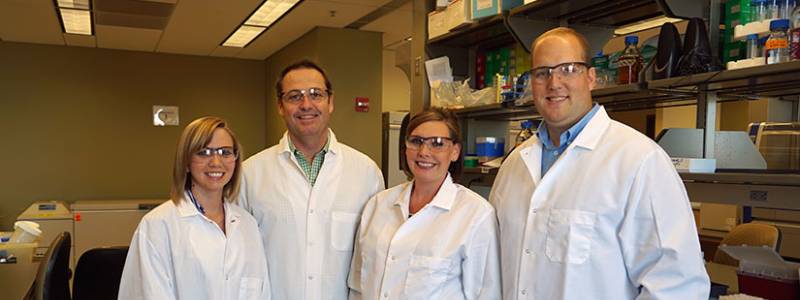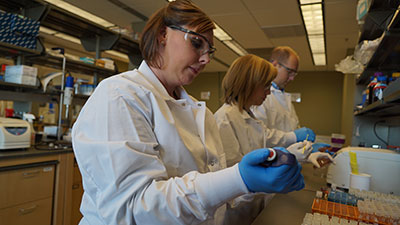Texas Tech Graduate Students Find Professional and Personal Growth in Paris Laboratory

Left to right: Hattie Webb, Guy Loneragan, Sarah Hazenfield and Josh Ison
Graduate school is about opportunities. For a trio of Texas Tech University animal science doctoral candidates, a chance conversation at a food safety conference three years ago opened a door conducting research in a French government laboratory.
Hattie Webb, Josh Ison and Sarah Hazenfield spent most of the last 12 months in the French Agency for Food, Environmental and Occupational Health and Safety in Paris.
"Working in the French laboratory expanded my insight," said Webb. "It's a lot different working in a government lab. We had access to different equipment and different ideas. You get a unique view by being exposed to different objectives."
Hazenfield agrees. "The experts I worked with were focused on E coli," she said. I was able to benefit from their insight and really examine the bacteria on a genetic and molecular level and how it can be transmitted through different mechanisms. It was extremely helpful to my own research interest."
Food Safety Research
Webb, Ison and Hazenfield are all working on some form of food safety research. Webb is focused on antibiotic resistance and Salmonella. Hazenfield is working on the genetic diversity of E coli and what characteristics are most dangerous to humans. Ison is interested in food borne disease surveillance, particularly Salmonella in poultry. Their research interests are different enough to allow each student to excel in separate areas, yet complimentary enough to provide common ground.
"We are able to work with each other's strengths," said Ison. "The lab protocols are similar. We can take the different aspects of what we do and work together as a team."
Working in the Texas Tech lab of Guy Loneragan, professor of animal science at Texas Tech and the advisor for all three students, provides a basis for that teamwork.
"We spend a lot of time working on problems that relate to animal and human health," he said. "We look at a lot of questions that draw media attention such as dangerous E coli and Salmonella and antibiotic resistance. But I think what's different about our wider research group is that we don't just look at it from a microbiology aspect or a gene or population perspective. We try to combine the different perspectives from both the animal and human aspect."
 From Lubbock to France
From Lubbock to France
While the initial collaboration with the French agency began in fall 2014, the idea originated at a conference about three years ago when Loneragan and a fellow animal and food science faculty member, Kendra Nightingale, presented work at a food safety conference in France.
"Over a bottle of wine and some wonderful food, we talked with researchers from the Paris laboratory at the conference and at subsequent meetings one of his colleagues told me they had resources to fund supplies for projects and asked if Texas Tech would like to collaborate through our graduate students," Loneragan said.
That conversation led into Webb and Hazenfield (and another PhD student, Byron Chaves) spending three months in Paris. The students made such a positive impression that they were asked to return.
Ison and Webb both travelled to France supported by a prestigious and highly competitive Chateaubriand Fellowship awarded by the French Embassy which is designed to initiate or reinforce collaborations between American and French research teams. Hazenfield, who was part of an initial collaboration, returned with support from the French agency and Texas Tech.
Ison's work looks at two separate food borne bacterial surveillance systems to see how comparable they are and if the overall objectives of each are being met. His work has formed the basis for his dissertation and he presented a paper at a conference in Italy in addition to preparing a paper to submit for publication. Hazenfield has had one paper published and another accepted in prestigious journals based on her work and Webb has two papers submitted for publication and others in development.
"The outcomes have been far more productive than I had ever imaged or could have hoped for," Loneragan said. "I think having students who are adventurous and willing to step outside their comfort zones takes what we can do in our lab here at Texas Tech to a different, higher level."
The French agency is interested in hosting more Texas Tech students and they are interested in Webb, Ison and Hazenfield returning as well in some fashion. "Our students left a very positive impression and that will allow us to continue the collaboration," Loneragan said.
"And our collaboration has expanded" continued Loneragan, "Initially it was primarily Kendra Nightingale and me as the student advisors from our side but it quickly expanded to include other faculty including Marie Bugarel and Henk den Bakker and others. This benefited the students, it increased what our French colleagues could do, and grew the collaboration as a whole. Our students' willingness to be adventurous made this happen."
Broadening Their Horizons
The professional results of the students' international research are obvious. As for the personal side, the experience has changed each of the students.
For Webb, this was her second lengthy international experience. She earned her master's degree in Scotland. "The experiences have really changed my world view," she said. "I learned that the world isn't quite so big. Home really is just one flight away."
"You make a lot of friends with people you would never have met otherwise," Hazenfield said. "To see how they view Americans is very awakening."
Ison agrees it expanded his world view and offered opportunities to absorb different cultures. It also taught him a practical lesson. "I learned just how little stuff you need to survive," he laughed. "Especially living in the very small space we had in Paris it was an eye opening lesson in how other people live."
Hazenfield and Ison have found that their work has strengthened another part of their lives – the two are married. "It's really good to work together and be able to bounce ideas off one another," Hazenfield said. "It does teach you about the work-life balance."
Ison agrees. "We always have a support structure," he said. "We try not to take work home, but we do find ourselves talking about what we're doing a lot."
The trio's time as graduate students is fast drawing to a close. And again they share a significant milestone in their young professional careers. They all defend their dissertations on the same day in March 2016 and each of their committees include two of the French collaborators. While none are sure exactly what the future holds, there is a lesson each will take with them: be open to opportunity.
"I never would have dreamed that I would go to Europe for almost a year to do research," said Webb. "Graduate students should not be scared to try for a fellowship or a research opportunity you may not have considered before. You never know until you apply. My mother always told me the worst that can happen is you get told no."
Office of Research & Innovation
-
Address
Texas Tech University, 2500 Broadway, Box 41075 Lubbock, TX 79409 -
Phone
806.742.3905 -
Email
vpr.communications@ttu.edu
